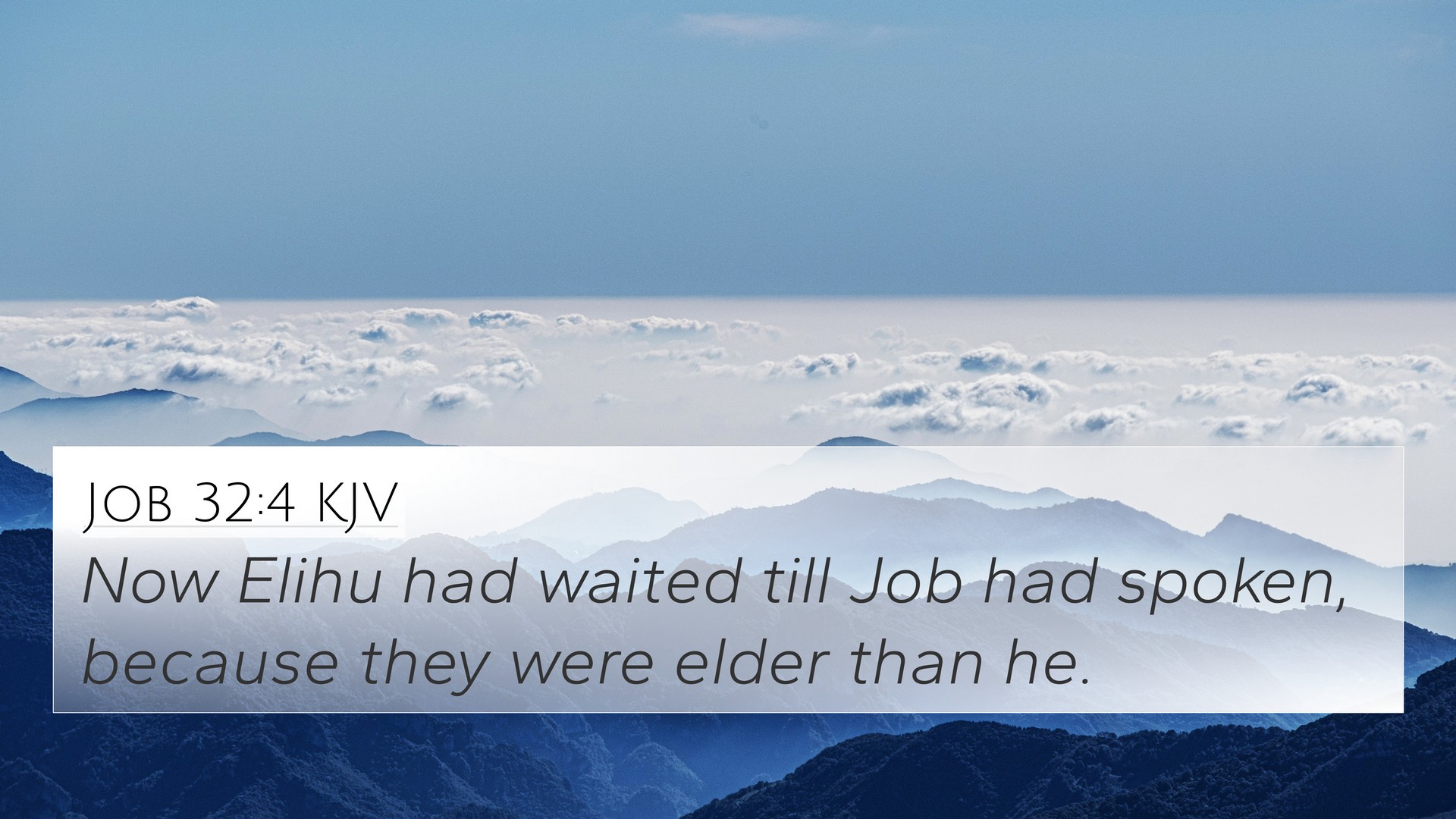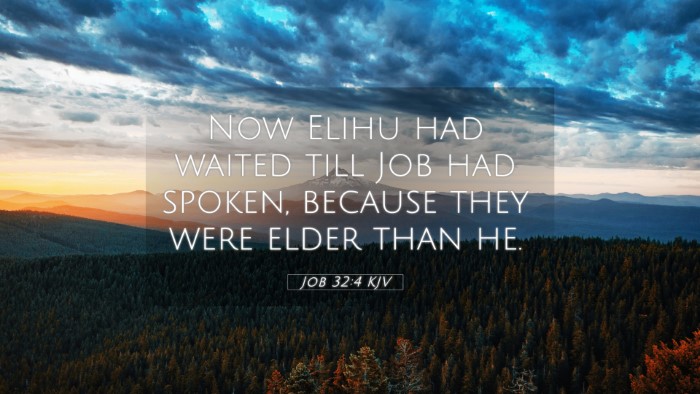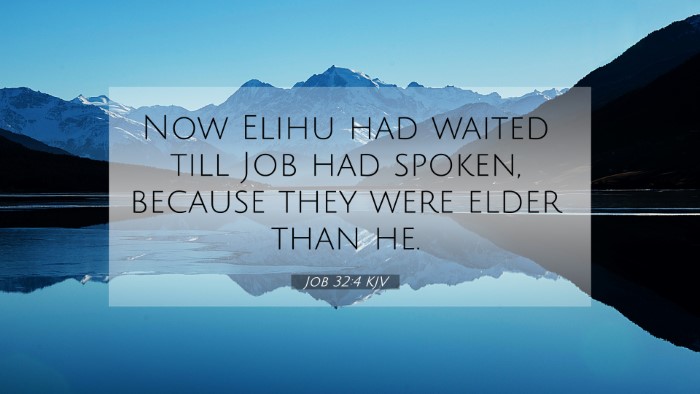Old Testament
Genesis Exodus Leviticus Numbers Deuteronomy Joshua Judges Ruth 1 Samuel 2 Samuel 1 Kings 2 Kings 1 Chronicles 2 Chronicles Ezra Nehemiah Esther Job Psalms Proverbs Ecclesiastes Song of Solomon Isaiah Jeremiah Lamentations Ezekiel Daniel Hosea Joel Amos Obadiah Jonah Micah Nahum Habakkuk Zephaniah Haggai Zechariah MalachiJob 32:4 Similar Verses
Job 32:4 Cross References
Now Elihu had waited till Job had spoken, because they were elder than he.
Uncover the Rich Themes and Topics of This Bible Verse
Listed below are the Bible themes associated with Job 32:4. We invite you to explore each theme to gain deeper insights into the Scriptures.
Job 32:4 Cross Reference Verses
This section features a detailed cross-reference designed to enrich your understanding of the Scriptures. Below, you will find carefully selected verses that echo the themes and teachings related to Job 32:4 KJV. Click on any image to explore detailed analyses of related Bible verses and uncover deeper theological insights.

Job 32:11 (KJV) »
Behold, I waited for your words; I gave ear to your reasons, whilst ye searched out what to say.

Proverbs 18:13 (KJV) »
He that answereth a matter before he heareth it, it is folly and shame unto him.
Job 32:4 Verse Analysis and Similar Verses
Understanding Job 32:4
Job 32:4 states: "Now Elihu had waited till Job had spoken, because they were elder than he." This verse captures a moment in the dialogue of the Book of Job, specifically reflecting Elihu's approach to the discourse.
Context of the Verse
The Old Testament narrative in the Book of Job focuses on the themes of suffering, justice, and divine sovereignty. Elihu is introduced as a young man who has been listening to the older men debate with Job, and his silence up to this point indicates respect for their wisdom. However, this respect also suggests a growing impatience with the inadequacy of their answers.
Interpretation of Job 32:4
This verse emphasizes several key themes:
- Deference and Humility: Elihu shows respect towards the elders, which highlights the cultural importance of age and experience in ancient Israel.
- Impatience for Truth: His wait indicates a tension between respect for traditional wisdom and a desire to bring forth what he believes to be a more accurate understanding of God and suffering.
Insights from Commentaries
Matthew Henry's Commentary
According to Matthew Henry, Elihu's patience signifies his contemplation and desire to bring clarity to the discussion about suffering. He notes that Elihu wishes to provide perspective that may be lacking among the others, which demonstrates Elihu’s role as a necessary voice in the divine discourse.
Albert Barnes' Notes
Albert Barnes emphasizes that Elihu’s waiting was not merely out of respect but also an indication of his preparedness to contribute meaningfully to the conversation. His insights would ultimately provide a unique approach compared to the older men’s arguments.
Adam Clarke's Commentary
Adam Clarke points out that Elihu represents a bridge between Job and the other friends, suggesting that youth must sometimes wait to speak until it is their time, but they must also be ready to confront traditional thoughts with new understanding.
Cross-References for Job 32:4
This verse is closely related to several others in the Bible that echo its themes of wisdom, patience, and the respectful sharing of truth:
- Proverbs 1:5: “A wise man will hear, and will increase learning; and a man of understanding shall attain unto wise counsels.”
- Job 12:12: “With the ancient is wisdom; and in length of days understanding.”
- Proverbs 18:13: “He that answereth a matter before he heareth it, it is folly and shame unto him.”
- James 1:19: “Wherefore, my beloved brethren, let every man be swift to hear, slow to speak, slow to wrath.”
- Job 32:6: “And Elihu the son of Barachel the Buzite answered and said, I am young, and you are very old; wherefore I was afraid, and durst not shew you mine opinion.”
- Proverbs 17:27: “He that hath knowledge spareth his words: and a man of understanding is of an excellent spirit.”
- Job 33:4: “The Spirit of God hath made me, and the breath of the Almighty hath given me life.”
Thematic Connections
The verse links thematically with wisdom literature and the understanding of suffering in human experience:
- Suffering and Wisdom: Job’s responses and Elihu’s interjections prompt reflections on the nature of divine justice.
- The Role of Youth in Discourse: Elihu's perspective is an essential reminder that wisdom can come from unexpected sources.
Conclusion
Job 32:4 serves as a turning point in the narrative, symbolizing a shift in discourse where the voice of a younger generation seeks to contribute to the conversation about suffering and justice. As seen through cross-references and commentary insights, it invites readers to reflect on the balance of respect for tradition alongside the necessity of fresh perspectives in understanding divine truths.


